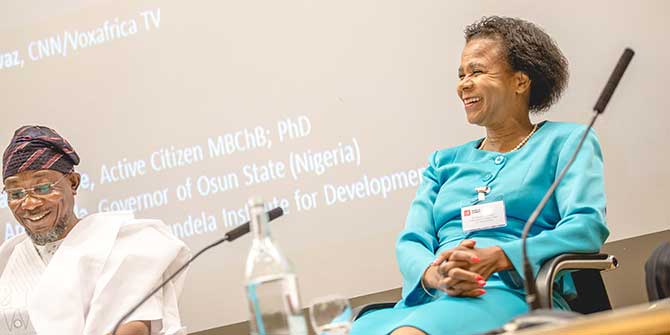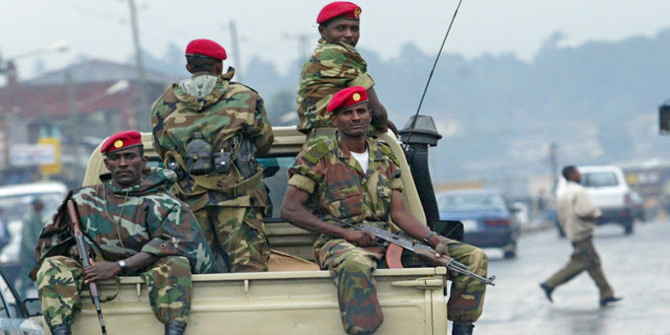Fabien Cante says this book is a formidable place to start for those seeking to move beyond policy approaches.
In a recent essay, LSE’s Kate Meagher ponders a sudden shift in the narrative about Sub-Saharan Africa. She is puzzled that a demographic reality once looked upon with despair – the fact that the number of people able to work continues to outstrip the number of available jobs, by far – has become a cause for optimism, even celebration. Meagher argues that this narrative shift signals a new international “scramble for Africans”: global capital’s ambition to integrate African workers into a worldwide labour pool, ignoring the negative implications this may have for local economies, and for workers themselves.
The reason I open with Meagher’s article is to illustrate the fact that Africa is a continent about which many wildly different stories have been told. It is also a continent which is not always provided the chance to tell its own stories: the narratives of development, or state failure, or socio-economic “structural adjustment,” are mostly told from the outside, certainly in the lingo of international institutions. As a new narrative begins to “buzz” – that of latent capitalist opportunity – the need for considered, historical perspective is pressing. Equally, it is crucial to interrogate contemporary Africa through the lens of Africans’ lived realities, on their own terms. This is exactly what The Political Economy of Everyday Life in Africa sets out to do.
Edited by Professor Wale Adebanwi, the book is a wide-ranging compendium of rigorous and critical scholarship on Africa, past and present. It is by no means an easy book. Some of the chapters’ theoretical propositions are complex, while the themes covered – money, work, social life, poverty, health, history, memory and democracy, no less – are as vast as they are dizzyingly multi-faceted. But it is in this richness, and in the authors’ combination of theoretical ambition and empirically-grounded nuance, that the book acts as a veritable treasure-chest. It also acts as a counter-point to both the snappy, indicator-driven stories of transformation that currently abound, and the more long-standing, doom-and-gloom imaginaries of African stagnation.
At the heart of the book lies the path-clearing work of economic anthropologist Jane I. Guyer. Guyer is best known for studying macro-level processes, from state regulations to market re-organisation, as they have manifested in Africans’ everyday life (mostly in Nigeria and Equatorial Guinea). Guyer’s prolific scholarship offers conceptual anchors for very different chapters in the book, from David Pratten’s fairly straightforward historical consideration of how currency fluctuations fed into social protest in colonial Nigeria, to economist Célestin Monga’s arresting attempt to combine mathematical modelling with anthropological insights. Yet if one were to pick out a single thread, running through the volume, it would be Guyer’s concept of “self-realisation.”
Most fundamentally, Guyer is concerned with the ways that ordinary Africans give their life value – understood both in economic and moral-philosophical terms – in contexts where macro-level processes impose very harsh, rigid forms of valuation, or even devaluation. Put more simply, Guyer asks: if people’s lives are increasingly given value in monetary terms, in globalising market economies and attendant policies, what happens to people’s sense of self-worth when there is little or no money around? How do people then approach and re-fashion the frames of economic valuation that are supposed to orient their lives? In the end, what values to ordinary Africans attribute to money itself, and what alternative values do they draw on to make a “liveable life,” as Adebanwi puts it in the book’s introduction ?

Guyer, together with the authors in the volume, argues that any statement about social and economic dynamics in Africa should simultaneously consider ordinary Africans’ often exceedingly difficult conditions of life, and the agency they deploy to articulate their own values and aspirations. While this may seem like a simple and consensual premise, the book’s various chapters show just how difficult it can be to carry out such an analysis. Difficult because – going back to the stories told about Africa – the most powerful discourses on the future of the continent rarely allow meaningful consideration of basic human well-being. It often feels like the anthropological language describing everyday meanings and practices of povert is impossible to translate into, say, the language of international economic policy.
This mismatch has roots in the colonial encounter, as several chapters in the book demonstrate. Chapters by Jean and John Comaroff, Peter Geschiere and Tristan Oestermann, and Elisha P. Renne, document the complexity of imposing Western socio-economic frameworks on African societies during colonial occupation – an imposition that caused much violence, anguish, as well as some creativity and compromise. Frederic Cooper’s masterful chapter on “the labour question in African history” perhaps best captures the ways that Western concepts – in this case, concepts that describe work and its organisation – misread African realities. Cooper argues that, for the past 250 years, categories used to describe labour in Africa, by colonisers, Marxist academics, and free market advocates alike, have consistently failed to account for the locally complex and globally uneven social relations in which Africans’ working lives are embedded.
It is not just international institutions and Western scholars who fail to consider Africans’ lived experience. The chapters by Anne-Maria Makhulu on predatory lending in post-apartheid South Africa, and by Gbemisola Animasawun on the regulation of moto-taxis in Lagos, among others, show how much private companies and public authorities within African countries are willing to ignore the crippling uncertainty and precariousness faced by a majority of the population. This leads to violently absurd programmes and policies that Animasawun describes as “anti-people.”
If carefully studying the “political economy of everyday life” in Africa is difficult, then, it is also urgent – and rewarding. Rather than dismissing the concepts used by economic policy or Western social science, the authors refract these concepts through the prism of everyday life in Africa. Thus, seemingly straightforward terms such as money, work, illness or even time, can be deconstructed and re-built to incorporate the complexity of contemporary African societies, rather than elide it. Ultimately, such a research endeavour does not simply give us a better understanding of the African continent. It also confirms that Africa, when it is allowed to tell its own stories, can inform global discourses and debates in unimagined ways. As Jane Guyer puts it in the Afterword (p. 341), the chapters collected in this volume “make strong arguments for the creativity that could be released if Africa were not intellectually marginalised, but rather engaged with, as a crossroads beyond the margins of bounded intellectual geographies that mark off their own terrain.”
In conclusion, The Political Economy of Everyday Life is an essential volume. For scholars of Africa, several of the contributors and perspectives may well be familiar (more than half of the book’s contributors are professors, who have published widely), but the gathering of critical perspectives offers a rare opportunity to take stock of what James Ferguson calls a “shared intellectual sensibility” (Foreword, p. xvii). For those who are not so familiar with African research, or who may want to move beyond policy approaches, this book is a formidable place to start.
The Political Economy of Everyday Life in Africa:Beyond the Margins, edited by Wale Adebanwi.
Fabien Cante is an interdisciplinary researcher interested in media, cities, and their politics. His recently completed PhD thesis (LSE Media & Communications, 2017) problematized the role of media infrastructures in facilitating post-conflict cohabitation in Abidjan, Côte d’Ivoire.
The views expressed in this post are those of the author and in no way reflect those of Africa at LSE blog or the London School of Economics and Political Science.






1 Comments